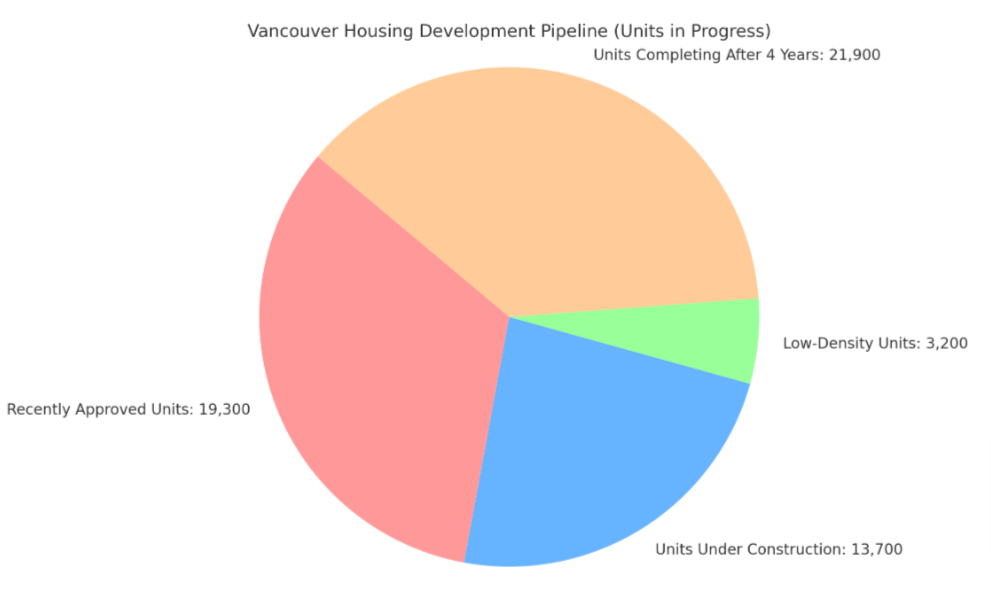The City of Vancouver has published its first Annual Progress Report on its efforts to meet the provincial housing targets, marking a significant step toward addressing the region’s housing needs. Despite facing challenges such as rising interest rates, construction costs, and labour shortages, Vancouver’s development pipeline is on track to meet the provincial housing targets set for the next five years.
Progress Toward Provincial Housing Targets
Between October 1, 2023, and September 30, 2024, Vancouver completed 4,143 new housing units. This represents 80% of the year-one target set by the Province. The targets per year are:
Year 1: 5,202
Year 2: 10,597
Year 3: 16,281
Year 4: 22,349
Year 5: 28,900
Currently, there are about 58,100 housing units in various stages of development across the city. This includes 19,300 recently approved units, 13,700 units under construction, and an additional 3,200 low-density units (such as laneways, duplexes, and multiplexes) expected to be completed within the five-year target period.
In total, Vancouver’s homebuilders are expected to deliver 33,700 units by the end of the Housing Target Order period, surpassing the provincial target of 28,900 units by a significant margin.
Collaborative Efforts to Achieve Targets
Meeting the housing targets will require a collaborative effort from all levels of government, industry stakeholders, and other sectors of the economy.
The outlook presented by the City of Vancouver aligns with recent statistics from the Canada Mortgage and Housing Corporation (CMHC), which indicate a surge in housing starts in Vancouver. Over 7,200 units were started in the past year, with more than 2,100 rental units begun in the first half of 2024. These units are expected to be completed within the next one to three years, contributing to the city’s housing goals.
Provincial Housing Targets and Vancouver’s Role
The Housing Supply Act, introduced in the spring of 2023, allows the Province to set specific housing targets for municipalities across British Columbia. Vancouver, one of the first ten municipalities to be targeted, received its Housing Target Order on September 23, 2023. The order mandates the completion of 28,900 new housing units between October 1, 2023, and September 30, 2028.
Under the Act, municipalities are required to submit annual reports on their progress. Vancouver’s first report, covering the period from October 1, 2023, to September 30, 2024, shows steady progress, despite economic and external challenges. If municipalities fail to meet their targets, the Province can take action, including appointing advisors or issuing directives for additional measures.
In addition to the provincial targets, Vancouver also set its own 10-year housing goals. In June 2024, the City approved a target of 83,000 net new units over the next decade, further reinforcing its commitment to providing a range of housing options for both new and existing residents.
Future Outlook
Looking ahead, the City of Vancouver indicated that it is confident that it will meet and exceed the provincial housing target, with substantial growth projected in the development pipeline. However, this success will depend on the continued collaboration of municipal, provincial, and federal authorities, as well as the private sector. The City stated a commitment to streamlining its approval processes and ensuring that the housing supply continues to grow at the necessary pace to meet the needs of its residents.
By the end of the five-year target period, Vancouver is projected to complete more than 33,700 housing units, ensuring that the city’s housing market remains on track to meet both current and future demand.
Breakdown of Targets
The Provincial Housing Target includes guidance on the mix of housing units, including rental versus owned, and the size and affordability of units, for a five-year period up to September 2028.
Total units: 28,900
Ownership:
Rental units: 20,886 (72% of the total)
Owned units: 8,015 (28% of the total)
Unit size breakdown:
Studio and one-bedroom: 17,459 (60% of total units)
Two bedrooms: 5,231 (18%)
Three or more bedrooms: 6,209 (22%)
Affordability:
Market rental: 12,992 (45% of rental units)
Rental units affordable to low-income households: 7,894 (27% of rental units)
Supportive rental units: 583 (2% of rental units)
The breakdowns are not mandatory, but guide the municipalities to align their housing projects with the province’s affordability and unit size goals.

